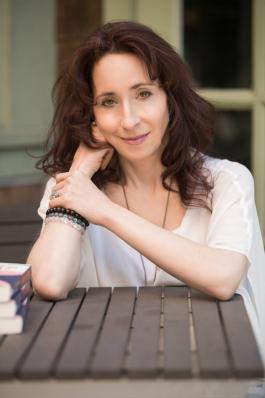By Nicholas Roznovsky
The UCSF Depression Center will hold a free evening seminar on March 20 for patients, caregivers, clinicians, and other community members interested in learning more about how stress can affect individuals with depression.
The event, “Strategies for Managing the Impact of Stress on Depression and Emotional Well-Being” will feature a keynote address by University of California, San Francisco professor of psychiatry Elissa Epel, PhD, as well as breakout sessions led by other community experts.

Elissa Epel, PhD, will deliver the evening's keynote presentation, "Stress Resilience for Preventing Depression: Making Stress Work for You."
Epel's research aims to elucidate mechanisms of healthy aging, and to apply this basic science to scalable interventions that can reach vulnerable populations. She is the director of the UCSF Aging, Metabolism, and Emotions Lab, and the UCSF Center for Obesity Assessment, Study, & Treatment, (COAST), and associate director of the UCSF Center for Health and Community. She studies psychological, social, and behavioral pathways underlying chronic psychological stress and stress resilience that impact cellular aging. She also studies the interconnections between stress, addiction, eating, and metabolic health.
With her collaborators, she is conducting clinical trials to examine the effect of self regulation and mindfulness training programs on cellular aging, weight, diet, and glucose control. Epel leads or co-leads several studies funded by the National Institutes of Health (NIH), including a stress network, and a UC multi-campus center on obesity. She is involved in NIH initiatives on the role of stress in aging, reversibility of early life adversity, and science of behavior change. She is on the Steering Council for the Mind & Life Institute.
Epel studied psychology and psychobiology at Stanford University, and clinical and health psychology at Yale University. She completed a clinical internship at the Palo Alto Veterans Healthcare System. Epel has received several awards including the APA Early Career Award, the Academy of Behavioral Medicine Research Neal Miller Young Investigator Award, and is a member of the National Academy of Medicine. She was named Innovator of the Year by the McLaughlin Group and received the 2017 Silver Innovator Award from the Alliance for Aging Research.
Her research has been featured in venues such as TEDMED, NBC’s Today Show, CBS’s Morning Show, 60 Minutes, National Public Radio, New York Times, Wall Street Journal, Wisdom 2.0, Health 2.0, and in many science documentaries. She co-authored "The Telomere Effect" with Elizabeth Blackburn in 2017, a NYT science bestseller. Epel leads retreats that integrate the science of healthy longevity and stress resilience with contemplative practices, and this year is co-leading a local retreat on stress resilience with Dan Siegel, MD, an international expert on attachment, relationships, and meditation.
Joining her at the event will be a team of mental health experts leading a trio of breakout sessions:
- Surviving Immigration and Acculturation Stress: Joyce Chu, PhD, and Sita Patel, PhD
- Mindfulness Meditation and Relaxation Strategies for Managing Stress: Stuart Eisendrath, MD
- Coping with Stress and Depression as Age Increases and Resources Decline: Beverly Lehr, PhD
“Strategies for Managing the Impact of Stress on Depression and Emotional Well-Being” will be held 6:00-9:00 p.m. on Tuesday, March 20, in Cole Hall on the UCSF Parnassus campus. Light refreshments will be available and the public is welcome and encouraged to attend. For more information or to RSVP, visit depressioncenter.ucsf.edu/2018event.
About UCSF Psychiatry
The UCSF Department of Psychiatry and the Langley Porter Psychiatric Institute are among the nation's foremost resources in the fields of child, adolescent, adult, and geriatric mental health. Together they constitute one of the largest departments in the UCSF School of Medicine and the UCSF Weill Institute for Neurosciences, with a mission focused on research (basic, translational, clinical), teaching, patient care and public service.
UCSF Psychiatry conducts its clinical, educational and research efforts at a variety of locations in Northern California, including UCSF campuses at Parnassus Heights, Mission Bay and Laurel Heights, UCSF Medical Center, UCSF Benioff Children's Hospitals, Zuckerberg San Francisco General Hospital and Trauma Center, the San Francisco VA Health Care System and UCSF Fresno.
About the UCSF Weill Institute for Neurosciences
The UCSF Weill Institute for Neurosciences, established by the extraordinary generosity of Joan and Sanford I. "Sandy" Weill, brings together world-class researchers with top-ranked physicians to solve some of the most complex challenges in the human brain.
The UCSF Weill Institute leverages UCSF’s unrivaled bench-to-bedside excellence in the neurosciences. It unites three UCSF departments—Neurology, Psychiatry, and Neurological Surgery—that are highly esteemed for both patient care and research, as well as the Neuroscience Graduate Program, a cross-disciplinary alliance of nearly 100 UCSF faculty members from 15 basic-science departments, as well as the UCSF Institute for Neurodegenerative Diseases, a multidisciplinary research center focused on finding effective treatments for Alzheimer’s disease, frontotemporal dementia, Parkinson’s disease, and other neurodegenerative disorders.
About UCSF
UC San Francisco (UCSF) is a leading university dedicated to promoting health worldwide through advanced biomedical research, graduate-level education in the life sciences and health professions, and excellence in patient care. It includes top-ranked graduate schools of dentistry, medicine, nursing and pharmacy; a graduate division with nationally renowned programs in basic, biomedical, translational and population sciences; and a preeminent biomedical research enterprise. It also includes UCSF Health, which comprises top-ranked hospitals – UCSF Medical Center and UCSF Benioff Children’s Hospitals in San Francisco and Oakland – and other partner and affiliated hospitals and healthcare providers throughout the Bay Area.





